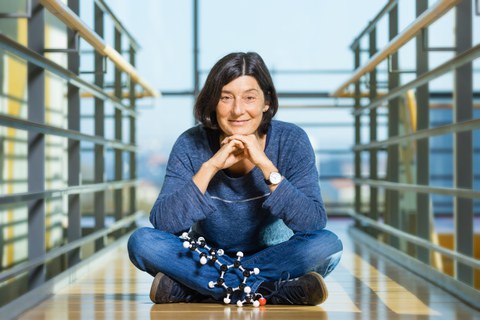Mar 05, 2018
Nanocar Race II: Pre-registration is Open

Dr. Francesca Moresco, cfaed Research Group Leader „Single Molecule Machines Group“
The European FET OPEN project MEMO (Mechanics with Molecules) is organizing the 2nd international Nanocar Race (Nanocar Race II), which will take place in 2021 at the CEMES-CNRS in Toulouse, France. The pre-registration for Nanocar Race II is now open and will close at the end of June 2018. The race is organized by an international committee around the cfaed research group "Single Molecule Machines" under the direction of Dr. Francesca Moresco.
The Nanocar Race is a playful idea to advance research with mobile "machines" on a molecular scale. Nanocar drivers use electrons from the tip of a scanning tunnelling microscope (STM) to help jolt their molecules along, typically by just tenth of nanometers each time, so that the nanocar race takes place on a very small scale. With about 100-1000 atoms and a lateral size of a few nanometers, a nanocar is a molecule with a distinguishable front and rear. Its chemical structure allows the nanocar to move on a surface when electrons flow through it from the STM tip. The propulsion mechanism can be either inelastic (related to the excitation of vibrational modes or to current-induced structural changes) or dipolar, resulting from the repulsion or attraction between the nanocar and the STM tip. The first Nanocar Race was held in Toulouse in April 2017, and was followed live by more than 100.000 people on the Youtube-channel.
In September 2018, the organization committee will screen the pre-registrations, select the teams authorized to compete, and fix the official surfaces and conditions. The list of teams, admitted to the Nanocar Race II, will be announced in January 2019. Then, each selected team will have two years to consolidate its nanocar design, the synthesis of the molecule-vehicle and the training. The final registration will be open in 2019. All teams will compete at the same time in a remote controlled mode from Toulouse. The competition will be live broadcasted.
The Nanocar Race II organization committee is composed by F. Moresco (MEMO & LT-UHV), A.S. Duwez (MEMO & ambient), C. Joachim (MEMO & Europe), S.W. Hla (America), M. Ariga (Japan), H. Gao (Asia), with the Patronage of J.P. Sauvage (Nobel Prize in Chemistry 2016).
About the MEMO project
The European FET OPEN project MEMO (Mechanics with Molecules), started in October 2017, has the goal to construct and test single molecule machines on a surface one at a time, controlling the rotation and the work delivered by a single molecule-motor directly at the atomic scale. MEMO will create the first miniaturization roadmap for mechanical machinery. The MEMO project is coordinated by Francesca Moresco at the TU Dresden and brings together six partners at the forefront of European research for the development of molecule-machines and nanofabrication: the Technische Universität Dresden (TU-Dresden) in Germany, the Centre National de la Recherche Scientifique (CNRS) in France, the Agencia estatal consejo superior de investigaciones cientificas (CSIC) in Spain, the University of Graz in Austria, the Université de Liège in Belgium, and the University of Manchester in UK.
Info Single Molecule Machines Group at cfaed:
https://cfaed.tu-dresden.de/francesca-moresco-group/home
Project website of Nanocar Race II:
https://memo-project.eu/flatCMS/index.php/Nanocar-Race-II
Media inquiries:
Dr. Francesca Moresco
TU Dresden, cfaed
Single Molecule Machines Group
Tel.: +49 (0) 351 463-39405
Matthias Hahndorf
TU Dresden, cfaed
Head of Communications
Tel.: +49 (0)351 463 42847
cfaed
cfaed is a microelectronics research cluster funded by the German Excellence Initiative. It comprises 11 cooperating institutes in Saxony, host university is the Technische Universität Dresden (TUD). About 300 scientists from more than 20 countries investigate new technologies for electronic information processing. These technologies are inspired by innovative materials such as silicon nanowires, carbon nanotubes or polymers or based on completely new concepts such as the chemical chip or circuit fabrication methods by self-assembling structures such as DNA-Origami. The orchestration of these new devices into heterogeneous information processing systems with focus on their resilience and energy-efficiency is also part of cfaed’s research program which comprises nine different research paths. https://www.cfaed.tu-dresden.de
